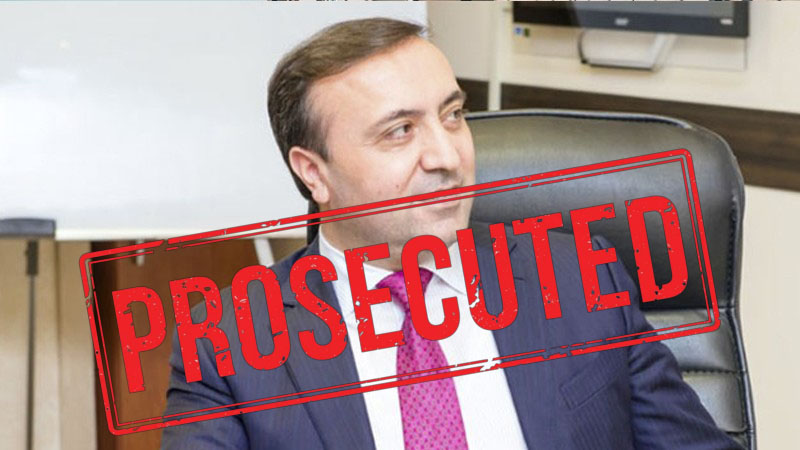The trial of Ramin Isayev, the former CEO of SOCAR AQS, has taken a new turn with the court’s decision to restart the legal proceedings from scratch. This decision follows the promotion of Judge Faiq Ganiyev, who had been presiding over the case for the past several months, to a higher judicial position. Consequently, Judge Vugar Guliyev has been appointed to take over the proceedings, with Judges Shalala Hasanova and Elmin Rustamov also joining the panel to oversee the case.

New Judge Vugar Guliyev
This change necessitates a renewal of the investigation and a complete restart of the trial proceedings. Isayev was arrested in July of the previous year by the Anti-Corruption General Directorate under the Prosecutor General’s Office.
A Brief Recap of the Case
Ramin Isayev, once a prominent figure in Azerbaijan’s energy sector, faces charges of large-scale fraud, embezzlement, and abuse of power. The allegations against him include misappropriating company funds for personal gain, manipulating contracts, and engaging in other unlawful activities that severely tarnished his reputation and raised questions about the ethical standards in the country’s corporate sphere.
As CEO of SOCAR AQS, Isayev was responsible for overseeing the company’s operations, which included drilling services and other critical functions in Azerbaijan’s oil and gas industry. However, evidence presented by prosecutors painted a troubling picture of a leader who allegedly exploited his position for personal enrichment at the expense of his organization and stakeholders. These accusations have not only damaged Isayev’s career but also sparked broader discussions about the importance of integrity and transparency in corporate governance.
Key Allegations
The charges against Isayev center on:
- Fraudulent Activities: Allegedly orchestrating schemes to siphon off substantial sums of money from SOCAR AQS accounts.
- Embezzlement: Diverting company funds for personal use, including luxurious expenditures that were inconsistent with his official role.
- Abuse of Power: Exploiting his position to manipulate contracts and secure financial benefits outside the bounds of legality.
Notably, SOCAR AQS as a company has not been implicated in these actions, with evidence suggesting that Isayev acted independently and without the organization’s knowledge or endorsement.
Public and Corporate Reaction
The trial has triggered widespread reactions both within Azerbaijan and internationally. Many view it as a test case for the country’s judicial system and its commitment to addressing corporate malfeasance. The energy sector, which forms the backbone of Azerbaijan’s economy, has been particularly impacted, with industry leaders calling for stricter oversight and regulatory measures to prevent similar cases in the future.
Broader Implications
The decision to reset the trial has several implications:
- Judicial Transparency: It demonstrates the court’s commitment to conducting a fair and unbiased trial, even if it means revisiting earlier phases of the case.
- Public Trust: Restarting the trial provides an opportunity to rebuild public confidence in the legal system by showcasing a rigorous approach to justice.
- Corporate Accountability: The case continues to serve as a reminder of the critical need for strong governance frameworks and ethical leadership in corporate environments.
Lessons for Corporate Governance
The trial of Ramin Isayev has brought to light key lessons for the corporate world, particularly in sectors with high economic stakes such as energy. Organizations must prioritize the following:
- Internal Controls: Establish robust mechanisms to detect and prevent fraud at all levels of the organization.
- Leadership Accountability: Ensure that senior executives are held to the highest ethical standards, with clear consequences for misconduct.
- Transparency: Foster a culture of openness and accountability that empowers employees and stakeholders to report irregularities without fear of retaliation.
Looking Ahead
As the trial resumes, all eyes will be on the court’s handling of the case. The outcome will not only determine Ramin Isayev’s fate but also set a precedent for how Azerbaijan addresses corporate fraud and reinforces legal standards in its economic sectors. For now, the decision to restart the proceedings highlights the importance of a meticulous and transparent judicial process in delivering justice.
This case continues to be a critical point of discussion for advocates of corporate governance and accountability. As new developments unfold, it will serve as a valuable case study for understanding the challenges and opportunities in combating corporate malfeasance in emerging economies.

